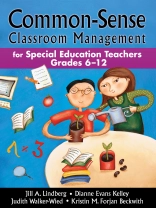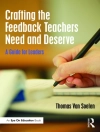‘Teachers will love the straightforward, practical information. The topics and strategies are excellent.’
—Debi Gartland, Professor of Special Education, Towson University
‘Impressive. Pinpoints current classroom issues and offers direct problem-solving approaches. This easy-to-implement resource, with its organized chapter outlines and well-crafted format, is flexible and adaptable to any grade, subject, or ability level.’
—Erin Ann Witty, Special Education Teacher, Milwaukee Public Schools, WI
‘Provides great insight for developing and organizing your overall daily routine, planning, and teaching.’
—Mariann C. Carter, Exceptional Needs Specialist, South Carolina Department of Education
‘A valuable reference for any special education teacher. With a focus on classroom management, the guide covers all aspects of teaching, from paperwork to professional relationships. New and veteran teachers will find indispensable resources to improve their practice and enrich their learning.’
—Peggy Holtman, Special Education Supervisor, Milwaukee Public Schools, WI
Special education teaching strategies in a no-nonsense format!
If you′re a teacher new to special education, this book is for you! This newest Common-Sense Classroom Management guide addresses the most critical challenges that arise when teaching adolescent learners with special needs.
In this flexible and easy-to-implement resource, educators will find 80 concise and teacher-tested strategies. Each strategy works in five steps or fewer, helping special educators feel competent and confident about working with coteachers, teacher aides, support staff, administrators, and families. The authors, all special education experts, provide practical assistance with:
- Specially designed instruction and student organization to make teaching more effective
- Legal responsibilities aligned with IDEIA and NCLB requirements
- Positive behavioral supports, including incentive programs and meaningful consequences
Ideal for teachers new to special education, teacher trainers, and teacher mentors, this resource provides a clear-sighted focus to help you shape the structure of each teaching day and ensure success for all your learners with special needs!
İçerik tablosu
Preface
Acknowledgments
About the Authors
1. Getting Organized
Student Information
Supplies and Materials
Your Desk and Surrounding Areas
Forms and Schedules
Room Arrangement
Wall Displays
2. Organizing Students
Preparing for Class
Storage Systems
Daily Oganizational Strategies
Routines and Rules
Peer Buddies
3. Delivery of Special Education Services
Determining Level of Educational Services for Students With Academic Disabilities
Determining Level of Support for Students With Behavioral Challenges
Providing Educational Services
Developing Your Schedule to Support Students
Sharing Student Information
Providing Services to Students With Disabilities Through Collaboration
Special Education Instructional Planning
4. Positive Behavioral Supports
Classroom Management and Coteaching
Providing Indirect Behavioral Support to Students Within the Inclusive Classroom
Managing Behavior in the Special Education Classroom
Addressing Individual Student Behavior Challenges
Managing Special Education Classrooms Designed for Students With Extremely Challenging Behavior
Tokens of Recognition and Other Fabulous Prizes
Activity Reinforcers
Backup Plans for Students Not Earning the Incentive
Consequences
When You Must Discipline
Functional Behavioral Assessment and Behavior Intervention Plan
Conducting a Functional Behavioral Assessment
Developing a Behavior Intervention Plan
5. General Education Instructional Planning
Your Involvement in the General Education Classroom
Planning for Academic Success
Planning for Behavioral Success
Grading Students With Disabilities
Coteaching and Co-planning
6. Specially Designed Instruction
Implementing the IEP
Finding Appropriate Materials
Individualized Work
The IEP and Assistive Technology
Using Assistive Technology as a Learning Support
Learning Strategies
Transition Planning
Transition Planning for Students Bound for Postsecondary Education
Instruction in Behavior
7. Legal Issues
Changes to the IEP Process as Required by IDEIA
Transition
Student and Parent Rights
Transfer of Rights
Functional Behavioral Assessments and Behavior Intervention Plan
Manifestation Determination
8. Working With Families
Before You Contact Families . . .
Establishing and Maintaining a Positive Relationship
IEP Meetings
Parent Conferences
Documentation
Assistance From School Support Staff
9. Working With Support Staff
The IEP and Support Staff Involvement
Support From the Special Education Administrative Staff
Support From the School Psychologist
Support From the School Social Worker
Support From the Guidance Counselor
Support From Transition Service Providers
Other Support Staff
10.Working With Teacher Assistants
Making a Schedule
Communication
Presenting a United Front
Assigning Responsibilities
Discussing Concerns
11. Working With Administration
Understanding Your Principal′s View of Special Education in Your School
Communicating With Your Principal
Principal Observations and Evaluations
Professional Development
What Is a Professional Learning Community?
12. Working Within Your School Community
Becoming Part of the Team
Teacher Buddies and Mentors
To Socialize or Not to Socialize
The Teachers′ Room
Ask for Help, Offer to Help
Other Supports for New Teachers
References
Suggested Readings
Index
Yazar hakkında
Dianne Evans Kelley has taught students with emotional/ behavioral disabilities in both inclusive and more restrictive classrooms for 10 years. Currently, she is an assistant professor in the special education department at Cardinal Stritch University in Milwaukee, WI. She has worked as a special education program support teacher for the Milwaukee Public Schools, where she provided inservice training and classroom-based support to teachers throughout the district. Kelley has worked with middle and high-school beginning special education teachers affiliated with the University of Wisconsin Milwaukee/Milwaukee Public Schools Special Education Internship Program. She has been an educational consultant since 1989 and has presented at the local, state, and national level on such topics as positive behavioral supports for students with challenging behavior and classroom management. Kelley has a master′s degree in special education and is currently working toward a doctorate in urban education/special education.












